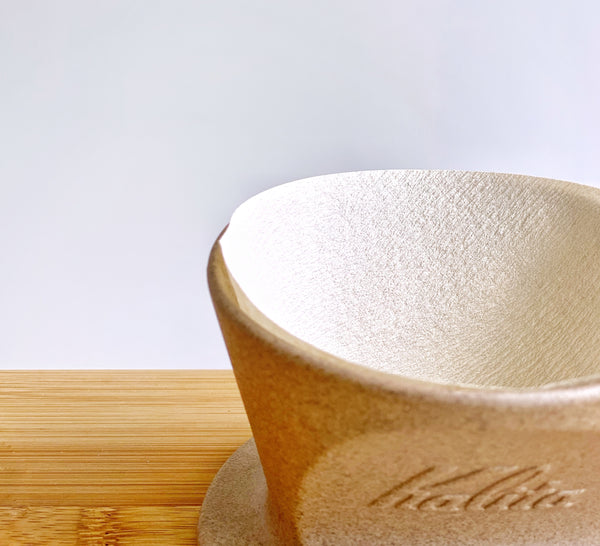The Magical Power of a Filter Paper
No doubt the same coffee beans brewed with different utensils will extract entirely different flavors, but so it is to the quality of filter paper: on the one hand it can extract the coffee essence perfectly, on the other hand it could completely destroy the flavor and waste the best beans.
The Truth about V60 Filter Papers
I remember watching a short clip by James Hoffmann a few years ago. In the video, he compared Hario’s filter papers made in two Japanese factories and a Dutch factory, and discovered the water permeability, paper quality and taste of the coffee were all very different. What’s more interesting was that he steeped the filter paper in hot water, and then he sipped the water to find out the original taste of the filter paper. Guess what he could taste?
He felt like “chewing a pencil”, tasted like “cardboard”, and surprisingly, “chemically leathery”.
While we are spending all our efforts looking for the best brewing utensils in the world to brew the most delicious coffee, a piece of filter paper, which we often overlook, might be just what we need. It is more powerful than we thought.
When did it start?
You might not believe that filter paper was created by a German housewife, Melitta, in 1908. She loves brewed coffee, but she hates the residue. She discovered that blotting paper could effectively remove the residue and retain the aroma of coffee. So, she applied for a patent and founded Melitta Bentz, which led to the success of filter paper.

Bleached or unbleached?
Today, filter papers are everywhere in the market, and they are mainly divided into two types: "bleached" and "unbleached". I personally prefer bleached filter paper, not only because of its nice white and clean appearance, but also because of the light and sweet taste of the paper itself, which does not really affect the flavor of coffee.
You might already be thinking that the bleaching process brings irreparable environmental pollution, and bleaching chromatin will also cause harm to human health. You’re right, but it depends strictly on the method and technology of bleaching. Some excellent brands use advanced enzyme bleaching, which makes use of biologically active enzymes that have no impact on the environment and the human body. This technology is also widely implemented in the medical field. So, the next time you are going to buy filter papers, it is worth paying careful attention to the bleaching method.
After all, we only want to enjoy a cup of “healthy” and delicious coffee.
If you are a naturalist, then unbleached filter paper is definitely your choice. Yet, it is also wise to note that the “light brown filter paper” itself has a stronger paper taste than the bleached filter paper. So, before brewing your nice coffee, it is advised to rinse the filter paper beforehand to wash away the unpleasant paper taste in the coffee. If there is still a strong flavour of paper after rinsing, then you might consider trying a new brand.

Eco-friendly Drippers
In recent years, many environmentally friendly metal drippers, ceramic drippers, and retro-style flannel filter cloths have been introduced to replace filter paper. I have great respect for environmentalists and I have personally also tried some of these drippers. Unfortunately, I have not been able to find a satisfactory solution.

Read more: Drippers Review: Suki Usagi Jirushi (月兎印)
Filter papers still have a great advantage in terms of convenience, hygiene and flavor extraction.
Cafec Abaca Filter Paper
At the beginning of the year, I came across Cafec’s Abaca filter paper through serendipity. Different from most filter papers that have only one crepe, this two-sided crepe filter paper has good water permeability, elasticity, and with a strong and durable texture. It does not look like normal paper. Later, I discovered that Cafec is actually the pioneer of conical filter paper and they are experts in it!

This Abaca filter paper is also made of an environmentally friendly material, Musa textilis. This replaces the use of wood and reduces forest resource consumption and environmental burden.
It turned out to be exactly what I want!
Which filter paper is better?
Try it yourself!
Shop now: Cafec Filter Paper
Continue Reading:

